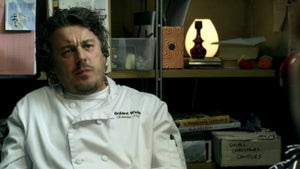Mysterious and wild-eyed, a new security guard for a cash truck surprises his co-workers when he unleashes precision skills during a heist. The crew is left wondering who he is and where he came from. Soon, the marksman's ultimate motive becomes clear as he takes dramatic and irrevocable steps to settle a score.
Look! It's another Guy Ritchie film with Jason Statham. They are likely a more iconic duo than Tim Burton and Johnny Depp, but when you have a winning formula, you don't really want to mess around with it too much, do you? Simply put, Wrath of Man has that non-linear storytelling that Guy Ritchie uses more often than M. Night Shyamalan uses twists in his filmmaking, and while the frenetic energy of his earlier films (Snatch, and Lock, Stock, and Two Smoking Barrels) has waned, this feature is still a tense, well-paced, action-thriller.
That shouldn't come as a surprise to anyone familiar with Jason Statham's work. While his signature fighting style has become repetitive (if you've watched the Transporter, Mechanic, or Fast & Furious franchise films), it is still fast, it has the aura of power, but most importantly, there is a precision in his style, that would have made him a brilliant John Wick, had he decided to move away from hand-to-hand combat sooner and transition to guns and marksmanship.
The appeal of a non-linear narrative in Guy Ritchie movies has always relied on the convoluted nature of the stories, to create a nearly unrecognisable plot that requires a narrator to guide the audience through the various moving pieces until the events form a cohesive story and the context adds meaning to previous scenes. It means far less in films like Wrath of Man, however, where the story is rather straightforward, with no real big twists. There is no big reveal that is obscured by the non-linear storytelling, and any of the "big reveals" come across as unearned as they are either heavily alluded to a mile in advance or have no context or purpose at all. It was always the interconnected nature of the characters that draws everything together, but Wrath of Man feels lazier as if Guy Ritchie simply wanted to create his own Kingsman or James Bond flick. Perhaps because this is not an original story, and is instead based on the 2004 French film, Cash Truck.
As a filmmaker, he still has more hits than misses, however, and Wrath of Man is still an incredibly entertaining film. It lacks the plot and character cohesion that would have made it a brilliant and thought-provoking piece, but when it comes to heists and gunfights, the action is in-your-face and delightful. Cinematographer Alan Stewart does a great job building a sense of uniformity and security in this armoured truck depot, and creates a strong sense of anger and power with the framing and lightwork of Statham's scenes, despite the surprisingly low level of long action sequences. The editing from James Herbert is a little glitchy at times but overall doesn't negatively impact the flow of the film. Christopher Benstead uses an interesting style of reverberating and repeating sound effects incorporated into the soundtrack of the film, which forms interesting transitions and builds a sense of unease and tension.
The characterisation is weak. Most characters are one-dimensional, and the final act throws everyone into identical suits, which makes it difficult to follow who is where, and the geography of the action sequences becomes easily muddled. It lowers the impact of the final act somewhat, leaving you expecting more to come, to only realise that the play has already been completed. Full of grey areas, the film's antagonists and protagonists are not really identified. Backstories are avoided, real names don't really exist, and everything is contained. It leads to a small-scale story with minimal investment in the characters' lives.
Don't let the trailer fool you. Post Malone barely manages a cameo, and Josh Hartnett's role is completely unnecessary and unwarranted. This film is all about the wrath of Jason Statham, and despite all of its drawbacks, Wrath of Man will still have you on the edge of your seat, grinding your teeth, and holding your breath. Ritchie's narrative style may be slowly unravelling, but his sense of tone is as strong as ever.
Wrath of Man is in cinemas from April 29, 2021




















